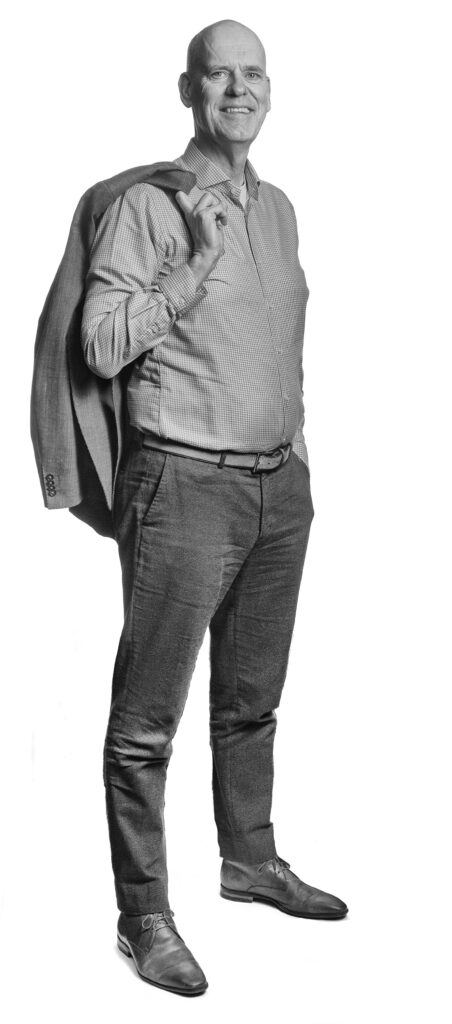The Wageningen Extinction Rebellion campaign group has been protesting for over a year now and efforts have been made to start a dialogue with the Executive Board. Are they getting any closer?
Extinction Rebellion (XR) demands transparency from WUR about collaboration with the private sector. They want a strong policy on the climate and ecological crisis, and they want students and staff to be involved in decision-making. Since the group started protesting they have met with the Executive Board and engaged in a climate policy dialogue with Rector Magnificus Arthur Mol. But XR keeps on protesting. Time to invite one of the XR students Solina Diallo and Executive Board member Rens Buchwaldt and ask them if they are getting any closer.
Solina: ‘We want to know what reasons and risks are considered when WUR starts a collaboration with private companies. When Unilever started on campus we found it difficult to find detailed information about the process that led to the decision.’

Rens: ‘We can’t find all the solutions and answers on our own anymore. There are a lot of challenges in this world and we want to have a positive impact. We feel the need to work together. This means working together with NGOs and other universities or institutions, as well as private companies. We have a policy on how we would like to engage with companies, which you can now find online. If new companies come to campus there are criteria and intentions that need to be in place. First, they have to be open to being part of our WUR ecosystem. Knowledge institutes that are active within the domain of WUR and be of interest for our students or researchers. Also, they should share their facilities with us, and vice versa. Can they add something and help us create impact? That is the process we try to engage in with them.’
WUR is sending the wrong message
Solina: ‘Of course we should not stay in our ivory tower. But we think that WUR is sending the wrong message. The companies that are on campus are not diverse. They all have the same vision on, for example, the future of the food system. There are many other food systems and visions of sustainability. Right now WUR is focusing on multinationals which create new demands that require a lot of technology and resources, and centralize power within the food system. This sends a message that WUR aims primarily at private sector collaboration.’
Rens: ‘You have a good point about the diversity of the ecosystem. We are a scientific institution and we need to widen our horizon. On the other hand, we have 180 parties and companies on campus, so there are many different views present. I agree with you that some of the parties on campus are the bigger companies. But we recently purchased Nergena, a building between the fields to the north of campus. It is a chance for the smaller organizations to join us that don’t want to be in the industrial heart of the campus. NGOs could move in there.’

Solina: ‘It is helpful to get an explanation like this. But I still think you should show students and staff more about the processes that are going on, and show us that you see that certain decisions can be controversial.’
Rens: ‘If we plan collaboration or new policy, we interact with different stakeholder groups like the WUR Council and the Student Staff Council. But one conversation about a topic is not enough, I agree with you on that. So we also try to engage with others outside these official parties, for example the session Rector Arthur Mol held with XR about the climate crisis. We need to work together.’
Solina: ‘And to work on a fundamental change. Wageningen aims to create science with societal impact which is an inherently political act, but shies away from taking a political stance on climate change.’
Rens: ‘WUR is a big mix of opinions and we take these into account. So if you look at the future of food, there is not one vision we can declare to be the vision. We need to constantly engage in all these different aspects and move forward. Different paths lead in different directions.’
Solina: ‘But the political aspect is still missing. The argument we usually hear about this is that WUR is not a political organization. I would love to see WUR acknowledge that there is a political component to food production. This should be part of the conversation.’
It needs to lead to something
Rens: ‘We have our Social Sciences group that deals with the political side. And in other groups too, we have the socio-economic side, as well as the technical side. The answer isn’t only in a political solution or in a technical solution. It’s a combination.’
Solina: ‘In the strategic plan you can read that we create societal value and are pursuing science that is close to society. Don’t you see a conflict there? Don’t we inevitably create something political with the science we promote to the world?’
Rens: ‘The primary aim is that we want to achieve impact. But to do that, we need to be independent, reliable and honest. We should not make one-sided statements, or we will lose our ability to have an impact. And we will lose our position as a source of knowledge and factual information.’
Solina: ‘I’m glad we are having this discussion, but it is a process and we will keep on demonstrating until something fundamentally changes in the way students and staff are being engaged.’
Rens: ‘You should, as long as we can engage about it. It needs to lead to something, not just to demands.’
See also: wur.nl/transparantie en wur.eu/transparency

 Rens Buchwaldt and Solina Diallo. Photo: Guy Ackermans
Rens Buchwaldt and Solina Diallo. Photo: Guy Ackermans
‘We have our Social Sciences group that deals with the political side.’ As a researcher at the Social Sciences Group we actually did an investigation into socially responsible research at Wageningen (see the 2019 report ‘Achieving responsibility at WUR.’) One of our recommendations was exactly for the university to develop a policy for private sector collaborations. This could acknowledge that there are political components to public-private collaborations and thereby open a discussion, without necessarily committing us to some monolithic vision on which companies are ‘good’ or ‘bad’ to work with. Back to you, Rens…
I am indeed aware of the ‘Achieving responsibility at WUR’ report, and met with Phil (Mcnaghten) at the presentation of the report in 2019. We have developed a WUR policy for private sector collaboration. Responsibility and integrity are fundamental for these collaborations. Through collaboration, we develop suitable solutions to societal challenges at a national and international level not just by offering our knowledge but also making our facilities available and supporting for instance start-ups. The public-private collaborations are a joint consortium with government, (public) knowledge institute and the private sector. This is a regulated form within the top sectors and European projects to inspire innovation. Let’s not forget, this triple helix model and collaboration is more critical than ever to address the immense societal challenges.
A dialogue ‘The impact of collaboration’ is planned for spring 2021 to continue our discussions regarding collaboration with the private sector. I hope to see you there.
Dear Rens, thank you for your reply, and indeed also for attending the presentation of our report. I was not aware yet of the policy, for private sector collaboration, so it’s nice to see that WUR now has one! (I assume you refer to the one listed at https://www.wur.nl/en/About-Wageningen/Finding-Answers-Together.htm).
Good to hear that the Dialogue on ‘the impact of collaboration’ is re-planned. The WUR Dialogues website still lists it as being postponed from 2020, with no new date, but I’ll keep an eye on the agenda. It will be nice to discuss how core values as integrity and responsibility can be operationalised productively at WUR. And to dig further into the politics issue, which seems to be a bit of a Catch-22: ‘not taking a political stance’ is really also ‘taking a political stance’. Just one that works with the political status quo, and the fact that some organisations in society are large and powerful, and others not, and does not necessarily try to change that. (Which is a valid position, but also one that I think WUR in some respects already goes beyond, given its CSR agenda.) I look forward to the Dialogue on this!